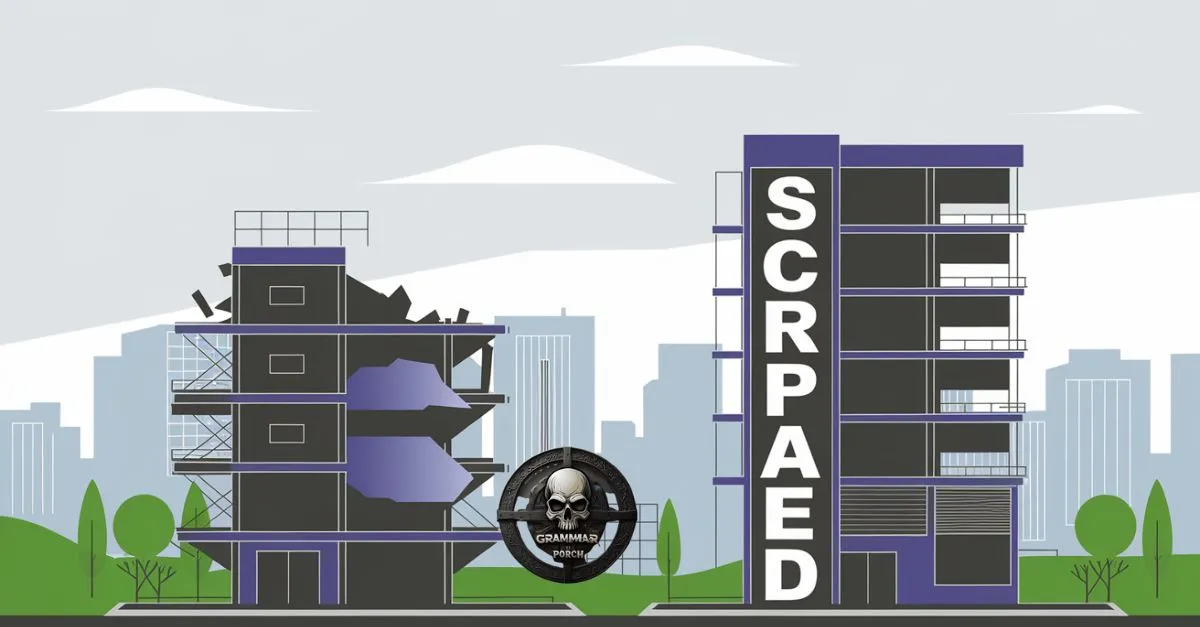In English, words like scrapped vs scraped often cause confusion due to their similar sounds and spellings. However, each has a unique meaning and specific uses. Scrapped means discarded or abandoned, typically referring to plans, projects, or items no longer needed. On the other hand, scraped involves a physical action, like removing something from a surface, or in digital terms, gathering data from websites.
Understanding the difference between these two words helps improve communication and ensures clarity in writing. This guide explores their definitions, uses, examples, and more to eliminate confusion and make your language use more precise and effective.
Why is There Confusion?

The confusion between scrapped and scraped largely stems from their close pronunciation and appearance. Both words have similar roots, but they apply to different contexts and scenarios. While scrapped is often associated with ideas or projects that are abandoned or discontinued, scraped refers to physical action—removing something from a surface by friction or force.
Many people also use these terms in different industries, adding further complexity. For instance, scraped is often used in data collection or digital fields, where it means to gather data systematically, while scrapped is commonly used in business or manufacturing to denote discarded items or plans.
In English, words with similar sounds often have different roots or meanings, so it’s essential to focus on clarity and precision in communication. If you remember that scrapped relates to abandoning plans or items, and scraped involves removing something physically or digitally, you’ll make fewer mistakes.
Definition of “Scrapped”

Scrapped means discarded or abandoned, and it often applies to plans, projects, or products that are no longer relevant or needed. For example, if a company decides to stop a project because it’s too costly, they would say the project was scrapped. This term appears often in business settings where decisions about resources are made. When something is scrapped, it’s not just paused; it’s generally eliminated entirely.
Mean of Word “Scrapped”
The concept of scrapped applies across many industries. In manufacturing, scrapped items are defective products that aren’t suitable for sale. In a corporate setting, a scrapped plan is one that’s no longer viable. Some synonyms include abandoned, cancelled, or discontinued, each of which reflects the sense of ending or stopping something. This term often has a finality to it, implying that the scrapped item won’t be revisited.
Definition of “Scraped”

Scraped refers to the action of removing a layer from a surface by rubbing or scratching. In physical terms, scraping might mean using a tool to remove paint or rust. However, scraped can also apply in digital contexts, where data is “scraped” from a website for information gathering. For instance, if you scrape your knee, you’ve accidentally rubbed the skin off. Scraped relates to physical contact and removal.
Mean of Word “Scraped”
In technology, scraped describes collecting data in an organized way, which is common in SEO and data analysis. Scraped data is collected to analyze trends or provide structured information for strategic decisions. Words like scratched, rubbed, or gathered have similar meanings depending on the context, whether it’s physical or digital.
“Scrapped” vs “Scraped”: Differences
Below is a detailed table showing the key differences between scrapped and scraped, making it easy to understand their unique contexts.
| Aspect | Scrapped | Scraped |
| Meaning | Discarded, abandoned | Removed, rubbed off |
| Usage Context | Business, manufacturing, planning | Physical action, digital data gathering |
| Common Synonyms | Abandoned, discarded, discontinued | Scratched, removed, erased |
| Example | “The plan was scrapped due to cost.” | “He scraped the paint off the wall.” |
| Field | Business, engineering, general usage | Physical action, data analysis |
Understanding these distinctions is vital for using precise language and avoiding errors. Remember, scrapped implies abandonment or removal from use, while scraped implies physical or digital removal.
Pronunciation of “Scrapped” vs “Scraped”
Both words sound similar but have distinct pronunciations. “Scrapped” has a clear “p” sound, while “scraped” features a slight “t” sound at the end, making them sound subtly different. Mispronunciation can lead to misunderstandings, so pay attention to these small variations.
To pronounce “scrapped,” focus on the short “a” sound and the emphasized “p” sound. For “scraped,” the long “a” is followed by a subtle “t” sound, which makes it sound closer to scraped than scrapped.
Which One is More Acceptable? Should You Use “Scrapped” or “Scraped”?

Choosing between “scrapped” and “scraped” depends entirely on context. If you’re talking about something being discarded or abandoned, “scrapped” is the right choice. For example, “The project was scrapped due to low funds.” But if you’re referring to physical removal or data collection, then “scraped” is more suitable, as in “She scraped the ice off the car” or “The program scraped data from the website.”
The context makes all the difference, and using the wrong term can confuse readers or listeners. Think carefully about whether the situation involves abandoning something entirely or removing it.
Examples in Context
Understanding scrapped vs scraped through examples can help clarify when to use each term. Here are ten sentences for each word, covering different uses.
Examples of Scrapped:
- The marketing team scrapped the campaign due to poor results.
- They scrapped the original design and started from scratch.
- The old machinery was scrapped after the factory upgrade.
- The product was scrapped because of safety concerns.
- Plans for the movie sequel were scrapped after low interest.
- The recipe was scrapped because it was too complicated.
- The city scrapped plans for the new park.
- The budget was scrapped when they cut funding.
- The design was scrapped after client feedback.
- The idea was scrapped to make way for a better plan.
Examples of Scraped:
- She scraped her knee while playing soccer.
- He scraped the paint off the old chair.
- The program scraped data from social media.
- They scraped ice off the car windshield.
- The dog scraped at the door to come in.
- The robot scraped dirt off the floor.
- Data scientists scraped information from various sites.
- He scraped rust off the metal rail.
- She scraped the burnt bits from the pan.
- They scraped mud off their shoes before entering.
Synonyms and Similar Terms to “Scrapped” and “Scraped”
For a broader understanding, here are synonyms and similar terms for each word.
Synonyms for Scrapped:

- Discarded
- Abandoned
- Discontinued
- Canceled
- Ended
Synonyms for Scraped:

- Scratched
- Rubbed
- Gathered
- Collected
- Removed
Origins of “Scrapped” and “Scraped”
Origins of “Scrapped”: The term “scrapped” comes from the idea of “scrap,” referring to waste materials, often metal. When something is scrapped, it’s seen as leftover, waste, or something no longer of value. Over time, this concept extended to anything abandoned or discarded.
Origins of “Scraped”: “Scraped” has roots in physical action, related to the old English “scrapan,” meaning to scratch or graze a surface. It developed to describe both physical removal and data collection in modern times.
5 FAQs
- What’s the main difference between scrapped and scraped?
- “Scrapped” means discarded, while “scraped” refers to removing by friction.
- Can these words be used interchangeably?
- No, they have different meanings and aren’t interchangeable.
- Are there different uses in UK and US English?
- Both words are used similarly in American and British English.
- Why are these terms confusing?
- Their similar spellings and
- pronunciation often cause confusion.
- What are the most common contexts for each word?
- “Scrapped” is used in planning and projects, “scraped” in physical removal or data collection.
Conclusion
Scrapped and scraped are similar in appearance but differ significantly in meaning. Scrapped means discarded or abandoned, often referring to plans or projects, while scraped describes the action of removing something physically or digitally.
Choosing the right term depends on the context: use scrapped for ending or eliminating something and scraped for physical removal or data collection. Understanding this distinction not only clarifies communication but also ensures you’re using the correct word in every situation, enhancing precision and clarity in writing.

Larry is an experienced blogger with a passion for simplifying grammar. With years of expertise in writing and language, he shares insightful tips on punctuation, synonyms, and the intricacies of English grammar at **Grammar Porch**. His approachable style helps readers improve their writing skills with ease.

